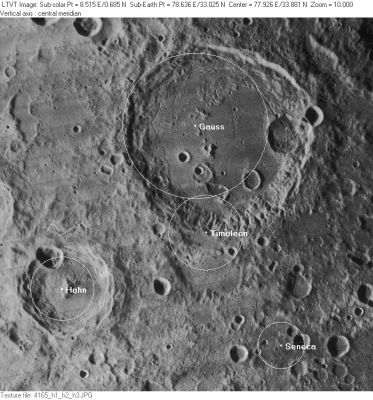Timoleon
Contents
Timoleon
(discontinued IAU name)|
Lat: 33.0°N, Long: 78.6°N, Diameter: 70 km, Depth: km, Rükl 16 |
Lunar Orbiter IV-165H The annotations show the positions and diameters of Timoleon, Seneca, Gauss and Hahn as listed in Named Lunar Formations. Seneca has since been moved.
Images
LPOD Photo Gallery Lunar Orbiter Images
Maps
Description
Crater south of Gauss, northeast of Hahn.
Additional Information
Nomenclature
- Named for Timoleon (ca. 411–337 BCE), a Greek general and statesman.
- Timoleon appears as catalog entry 137A in in the original IAU nomenclature of Blagg and Müller. The "A" indicates it is a new entry interpolated between the classic names documented in Blagg's Collated List. The name is attributed to the nomenclature committee, with a note that Schmidt called this feature Seneca. The coordinates are given as +0.822/+0.545 in the Xi-Eta system with a diameter of 0.040 lunar radii. These values are translated in the title line of this page. There is a note in Named Lunar Formations that Schröter also had a feature called Timoleon but that it was at +0.875/+0.478 (a position between the modern Rayleigh and Urey).
- Whitaker (p. 224) lists Timoleon as a new name introduced by Schmidt. This may be based on a note to features 26 (Plutarch), 137 (Seneca) and 137a on page 169 of the Collated List: "Schmidt's "Plutarch" seems to be identical, or nearly so, with Mädler's and Neison's "Seneca" ; while he calls their "Plutarch" "Timoleon," a new name chosen by himself. Schmidt's "Seneca" is a formation W. of "Hahn," not named by Mädler or Neison" ("W." would be called "east" in the current IAU directions). In other words, in Blagg's opinion, Schmidt did introduce the name, but for the IAU's Plutarch, and (as apparently later discovered in the preparation of Named Lunar Formations), Schröter had used the name earlier, possibly for what Schmidt called "Seneca".
- Timoleon was deleted by Gerard Kuiper in Table III of his Photographic Lunar Atlas. He regarded it as "scarcely identifiable; not a true formation". Kuiper's changes were approved by the IAU in 1961.
- The name Timoleon is still printed on some modern moonmaps, such as the Hallwag map and others.
LPOD Articles
Bibliography
- Longshaw, Nigel. 2000. "Timoleon", Where are You Now?.
